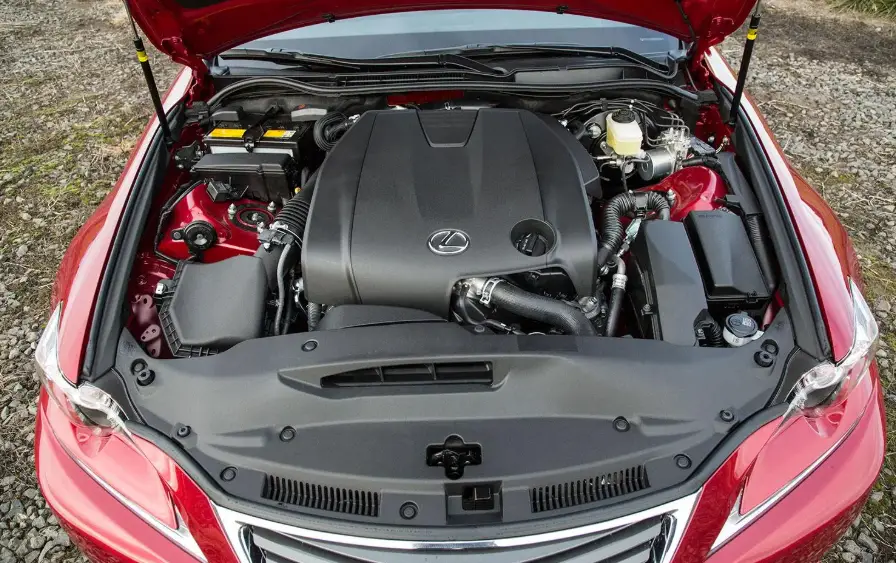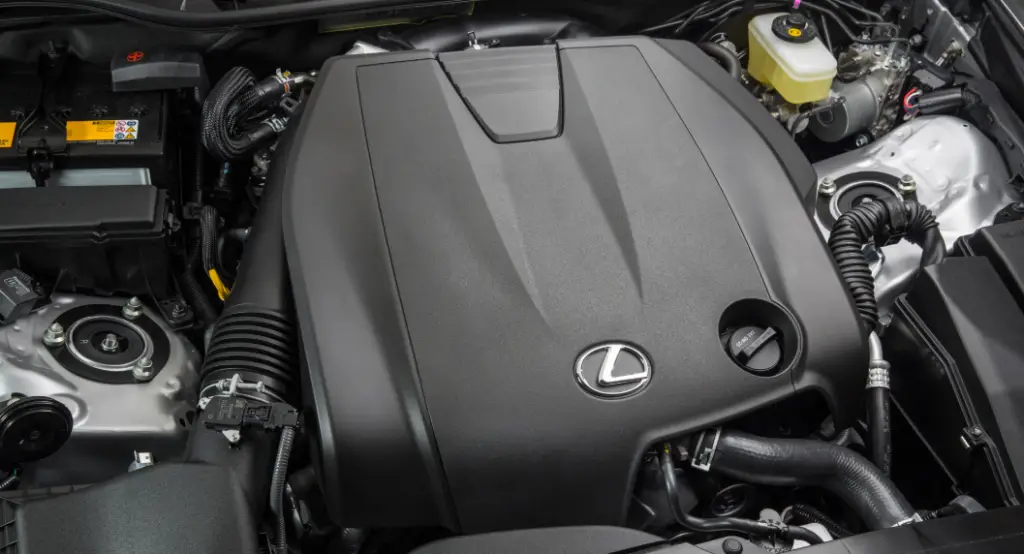Lexus IS 250 engine specs feature a 2.5L V6 with 204 hp and 185 lb-ft of torque. It uses dual VVT-i and pairs with a 6-speed auto or manual transmission.
The Lexus IS 250, a cornerstone of the IS (Intelligent Sport) lineup from Toyota’s luxury division, offers a compelling mix of refinement, engineering precision, and durability. Produced from 2006 to 2015, this entry-luxury sedan stood out not for sheer horsepower, but for its engineering sophistication and smooth, balanced V6 performance.
Whether you’re a prospective buyer, an enthusiast, or a DIY mechanic, understanding the IS 250’s engine specs gives you a deep appreciation for the car’s engineering intent.

Contents
Engine Architecture: 4GR-FSE
The beating heart of the IS 250 is the 4GR-FSE, a member of Toyota’s acclaimed GR engine family. It’s a 2.5-liter naturally aspirated V6, designed with a high-revving personality and smooth power delivery in mind.
Core Specifications:
- Displacement: 2,499 cc (2.5L)
- Configuration: 60° V6, aluminum alloy block and heads
- Valvetrain: DOHC, 24-valve, dual VVT-i (Variable Valve Timing with intelligence)
- Fuel System: D-4 (Direct injection with stratified combustion)
- Compression Ratio: 12.0:1
- Bore x Stroke: 83.0 mm × 77.0 mm
Why it Matters:
The high compression ratio, along with the D-4 direct injection, means better thermal efficiency, increased torque, and cleaner combustion. This engine was cutting-edge in the mid-2000s, offering more advanced combustion control than many of its competitors at the time.
Performance Metrics
Despite its refined engineering, the IS 250 wasn’t built to be a straight-line speed demon — rather, Lexus focused on smooth power delivery, throttle response, and NVH (noise, vibration, harshness) suppression.
Output Numbers:
- Horsepower: 204 hp @ 6,400 RPM
- Torque: 185 lb-ft (252 Nm) @ 4,800 RPM
- Redline: 6,500 RPM
- 0–60 mph (RWD): 7.5 to 8.1 seconds
- Top Speed: Electronically limited to ~140 mph
While these figures might not excite muscle car fans, the IS 250 delivers its power in a way that feels composed and linear — ideal for luxury cruising or spirited canyon drives, not drag racing.
Transmission Options
Lexus paired the engine with equally refined transmission options, tuned for smoothness and longevity.
- 2006–2013 Models:
- 6-speed Aisin automatic (A760E for RWD, A760H for AWD)
- 6-speed manual in some early RWD trims (rare and enthusiast-preferred)
- 2014–2015 Models:
- 6-speed automatic (RWD and AWD)
AWD Availability:
Yes, the IS 250 was offered in both RWD and AWD configurations, using a Torsen-based center differential in AWD models for added traction — especially beneficial in snowy climates.
Fuel Economy
With a focus on efficiency and emissions compliance, the IS 250 fares well for a V6.
| Drivetrain | City MPG | Highway MPG | Combined |
|---|---|---|---|
| RWD | 21 mpg | 30 mpg | 24 mpg |
| AWD | 20 mpg | 27 mpg | 22 mpg |
Real-world drivers often report slightly lower figures, especially in city driving or in older models with carbon build-up (a known issue with direct injection).
Maintenance & Reliability Notes
While the 4GR-FSE engine is generally reliable, there are a few maintenance caveats that any Lexus IS 250 owner should be aware of:
1. Carbon Build-Up:
Direct-injected engines like the 4GR-FSE are prone to carbon deposits on intake valves, especially with poor-quality fuel or extended oil change intervals.
Solution: Regular use of top-tier premium gasoline and intake cleaning every ~60,000 miles.
2. Water Pump & Cooling System:
The OEM water pump is a known wear item. Coolant leaks around 60,000–100,000 miles are common.
Solution: Replace the water pump proactively, and use only Toyota Super Long Life coolant.
3. Oil Consumption:
Some owners report light oil usage, especially on high-mileage engines.
Solution: Regularly monitor oil levels and use high-quality synthetic oil.

Engine Tuning & Aftermarket Potential
While not built for modification, some owners have explored:
- ECU remaps: Gains are minimal (5–10 hp) due to the naturally aspirated platform.
- Intake and exhaust upgrades: Improve throttle response and engine tone but don’t expect massive power gains.
- Forced induction kits: Supercharger kits are available (e.g., from RR-Racing), but require internal upgrades and careful tuning to maintain reliability.
Expert Opinion: If you’re after big power, the IS 250 isn’t your canvas — the IS 350 or IS F are better candidates. But if you want a refined V6 platform with a silky character, the IS 250 is a gem.
Driving Feel & Character
The 4GR-FSE engine isn’t about brute force — it’s about refined acceleration, balance, and harmony with the IS chassis. Combined with a finely tuned double-wishbone front and multi-link rear suspension, the IS 250 feels agile, composed, and luxurious in everyday use.
It’s a car that encourages smoother, more deliberate driving. Push it hard, and it’ll respond — but it shines brightest when driven gracefully.
Frequently Asked Questions
Here are some FAQs about Lexus IS 250 engine –
1. Is the Lexus IS 250 engine reliable long-term?
Yes, with proper maintenance. The 4GR-FSE can easily surpass 200,000 miles if serviced regularly, particularly with attention to oil changes and carbon build-up.
2. Can I run regular gasoline in an IS 250?
Technically, yes — but it’s not recommended. The high compression ratio requires premium fuel to avoid knocking and to maintain performance and fuel economy.
3. What kind of oil does the IS 250 use?
Lexus recommends SAE 0W-20 full synthetic oil, with oil change intervals every 5,000–7,500 miles depending on driving conditions.
4. How does the IS 250 compare to the IS 350?
The IS 350 uses a larger 3.5L 2GR-FSE V6 with around 306 hp. It’s significantly quicker and more powerful, but the IS 250 is lighter and often considered more balanced in urban driving.
5. Are there any common engine problems to look out for in used models?
Yes, primarily:
- Carbon build-up on intake valves
- Water pump leakage
- Minor oil consumption
All are manageable with proactive maintenance.
Final Thoughts: Is the IS 250 Engine a Good Choice?
From an engineering perspective, the Lexus IS 250’s 4GR-FSE engine is a masterclass in refinement and balance. While it doesn’t light up dyno charts, it offers a reliable, smooth, and luxurious driving experience that’s rare in this class — especially with a naturally aspirated V6.
If you want a car that rewards smooth inputs, lasts well beyond 100k miles, and exudes Lexus quality, the IS 250’s engine deserves respect.